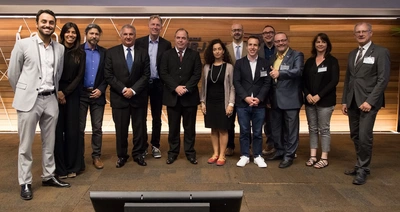
< Terug
Online Academy
Types
Themes
< Back
Our offer
Please install a more recent version of your browser.
7 July 2017
3 minutes read
From 27 until 30 June 2017 the Districts of Creativity Network’s ninth Reverse Mission took place in Rio de Janeiro, hosted by the city hall’s Institute Rio Human Patrimony (IRPH) and the Federation of Industries from the State of Rio de Janeiro (FIRJAN). The main theme of this study visit was 'making cities for people': how can creativity and innovation be fostered to tackle urban challenges?

The partners of the DC Network
The program kicked off at the Museu de Arte do Rio (Rio Museum of Art) for an introduction into the impressive urban transformation that took place in Rio de Janeiro’s port area. 5 million m2 were completely re-organised into a vibrant cultural hot spot.
It features the iconic and impressive new Museu do Amanha, a science museum designed by the Spanish architect Santiago Calatrava. Its content is presented through a combination of science, art and interactive technology.
Next stop was Fabrica Bhering. With 18.000 square meters this old chocolate factory is one of the most vibrating places for the creative community, where creative professionals such as painters, architects, designers, photographers, fashion designers and TV producers have their studios.
While one third of food produced in the world is wasted, millions of people stay hungry everyday and live in constant food insecurity. Refettorio Gastromotiva is an initiative brought to Brazil by chefs Massimo Bottura (Food for Soul), David Hertz (Gastromotiva) and by the journalist Ale Forbes to contribute to fighting food, malnutrition and social exclusion. Refettorio means recuperate and restore. At the Refettorio Gastromotiva recuperating food is just as important as promoting and restoring the dignity of people.

The port area completely transformed in 5 years, the Museum of Tomorrow in the background
“What impressed me was the strong commitment in Rio on harnessing creativity, and how widespread it is, as well as the many forms this creativity takes.”
The second day featured a visit to Centro Sebrae de Referência do Artesanato Brasileiro where the annual International Council meeting of the DC Network was held and a guided visit to the exhibitions took place. Centro Carioca do Design presented a project to revitalise traditional shops in the central area of Rio through applying service design methodology. The space brings together professionals, academics, decision makers, students and the general public to confront Rio’s most pressing urban challenges.

Centro Sebrae: the house of arts and crafts in Rio
Another highlight in the program was Agora, a conference organised by Firjan, the Federation of Industries of Rio, which has been investing for over ten years in Rio’s Creative Industry. Creative professionals and entrepreneurs showcased their work, alongside with presentations by the members of the DC Network.
In the afternoon during the DCLivingLab several projects, mainly led by youth organizations, showcased and pitched initiatives that address one or more issues related to the sustainable development goals of the United Nations. The projects presented innovative approaches to address local challenges, such as Casa Fluminense and Data_Labe’s 'Cocozap' ('poopoozap'), an app that explores the intense use of Whatsapp by the local population from Rio’s favelas in order to gather public data to identify poor sanitation spots at Favela da Maré, one of the major communities in Rio’s peripheries.
“I was impressed by the energy of the students and young talents who presented their plans and solutions during the DCLivingLab for problems the people of Rio face. The incubator initiatives of Rio Criativo and Mahla and the plan of Firjan to develop a house for creative industries offer ideas I can share with partners in Brabant.”

Casa Firjan, the house of the creative industries
The last day of the program included a visit to Casa Firjan da Industria Criativa, a magnificent renovation and new construction of a hot spot centre for Rio’s creative industries. The location will feature a think tank and exhibition and workshop spaces open for public.
Next stop was Malha, a bottom-up initiated textile/fashion incubator by people and brands who believe in a collaborative and sustainable future for carioca fashion. In the afternoon the program was closed off with a visit to Casa do Jongo, an NGO founded about 50 years ago in Madureira, in the northern suburbs of Rio de Janeiro. It promotes integrated projects in the areas of culture, arts, history, social and economic development, work opportunities and income creation.
In summary these four days were an unforgettable experience, packed with network opportunities, lots of interesting insights and learnings to take back home. In the framework of this Reverse Mission, Brazilian news paper Globo also interviewed Pascal Cools of Flanders DC on the importance of creativity and innovation and how to foster it.
Cookies saved